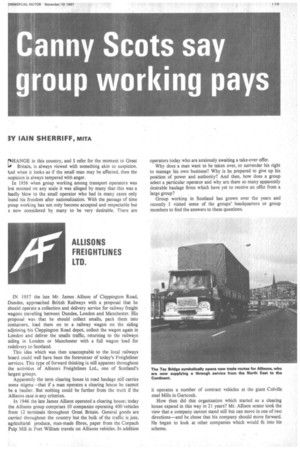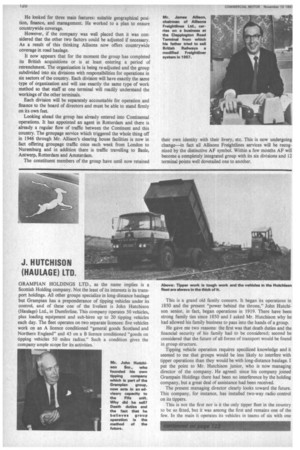Canny Scots say group working pays
Page 121

Page 122

If you've noticed an error in this article please click here to report it so we can fix it.
r. H A NGE in this country, and I refer for the moment to Great la Britain, is always viewed with something akin to suspicion. knd when it looks as if the small man may be affected, then the ;uspicion is always tempered with anger.
In 1956 when group working among transport operators was irst mooted on any scale it was alleged by many that this was a leadly blow to the small operator who had in many cases only bund his freedom after nationalization. With the passage of time ;roup working has not only become accepted and respectable but s now considered by many to be very desirable. There are IN 1957 the late Mr. James Allison of Cleppington Road, Dundee, approached British Railways with a proposal that he should operate a collection and delivery service for railway freight wagons travelling between Dundee, London and Manchester. His proposal was that he should collect smalls, pack them into containers, load them on to a railway wagon on the siding adjoining his Cleppington Road depot, collect the wagon again in London and deliver the smalls traffic, returning to the railways siding in London or Manchester with a full wagon load for redelivery to Scotland.
This idea which was then unacceptable to the local railways board could well have been the forerunner of today's Freightliner services. This type of forward thinking is still apparent throughout the activities of Allisons Freightlines Ltd., one of Scotland's largest groups.
Apparently the term clearing house in road haulage still carries some stigma—that if a man operates a clearing house he cannot be a haulier. But nothing could be further from the truth if the Allisons case is any criterion.
In 1946 the late James Allison operated a clearing house; today the Allisons group comprises 10 companies operating 400 vehicles from 12 terminals throughout Great Britain. General goods are carried throughout the country but the bulk of the traffic is jute, agricultural produce, man-made fibres, paper from the Corpach Pulp Mill in Fort William travels on Allisons vehicles. In addition operators today who are anxiously awaiting a take-over offer.
Why does a man want to be taken over, to surrender his right to manage his own business? Why is he prepared to give up his position of power and authority? And then, how does a group select a particular operator and why are there so many apparently desirable haulage firms which have yet to receive an offer from a large group?
Group working in Scotland has grown over the years and recently I visited some of the groups' headquarters or group members to find the answers to these questions.
it operates a number of contract vehicles at the giant Colville steel Mills in Garteosh.
How then did this organization which started as a clearing house expand in this way in 21 years? Mr. Allison senior took the view that a company cannot stand still but can move in one of two directions—and he chose that his company should move forward. He began to look at other companies which would fit into his scheme. He looked for three main features: suitable geographical position, finance, and management. He worked to a plan to ensure countrywide coverage.
However, if the company was well placed then it was considered that the other two factors could be adjusted if necessary. As a result of this thinking Allisons now offers countrywide coverage in road haulage.
It now appears that for the moment the group has completed its British acquisitions or is at least entering a period of retrenchment. The organization is being re-adjusted and the group subdivided into six divisions with responsibilities for operations in six sectors of the country. Each division will have exactly the same type of organization and will use exactly the same type of work method so that staff at one terminal will readily understand the workings of the other terminals.
Each division will be separately accountable for operation and finance to the board of directors and must be able to stand firmly on its own feet.
Looking ahead the group has already entered into Continental operations. It has appointed an agent in Rotterdam and there is already a regular flow of traffic between the Continent and this country. The groupage service which triggered the whole thing off in 1946 through Mr. Allison's clearing house facilities is now in fact offering groupage traffic once each week from London to Nure,mburg and in addition there is traffic travelling to Basle, Antwerp, Rotterdam and Amsterdam.
The constituent members of the group have until now retained GRAMPIAN HOLDINGS LTD., as the name implies is a Scottish Holding company. Not the least of its interests is its transport holdings. All other groups specialize in long-distance haulage but Grampian has a preponderance of tipping vehicles under its control, and of these one of the liveliest is John Hutchison (Haulage) Ltd., in Dumferline. This company operates 50 vehicles, plus loading equipment and sub-hires up to 20 tipping vehicles each day. The fleet operates on two separate licences: five vehicles work on an A licence conditioned "general goods Scotland and Northern England" and 45 on a B licence conditioned "goods on tipping vehicles 50 miles radius." Such a condition gives the company ample scope for its activities. their own identity with their livery, etc. This is now undergoing change—in fact all Allisons Freightlines services will be recognized by the distinctive AF symbol. Within a few months AF will become a completely integrated group with its six divisions and 12 terminal points well dovetailed one to another.
This is a grand old family concern. It began its operations in 1850 and the present -power behind the throne," John Hutchison senior, in fact, began operations in 1919. There have been strong family ties since 1850 and I asked Mr. Hutchison why he had allowed his family business to pass into the hands of a group.
He gave me two reasons: the first was that death duties and the financial security of his family had to be considered; second he considered that the future of all forms of transport would be found in group structure.
Tipping vehicle operation requires specilized knowledge and it seemed to me that groups would be less likely to interfere with tipper operations than they would be with long-distance haulage. I put the point to Mr. Hutchison junior, who is now managing director of the company. He agreed: since his company joined Grampain Holdings there had been no interference by the holding company, but a great deal of assistance had been received.
The present managing director clearly looks toward the future. This company, for instance, has installed two-way radio control on its tippers.
This is not the first nor is it the only tipper fleet in the country to be so fitted, but it was among the first and remains one of the few. In the main it operates its vehicles in teams of six with one




































































































































































































































































